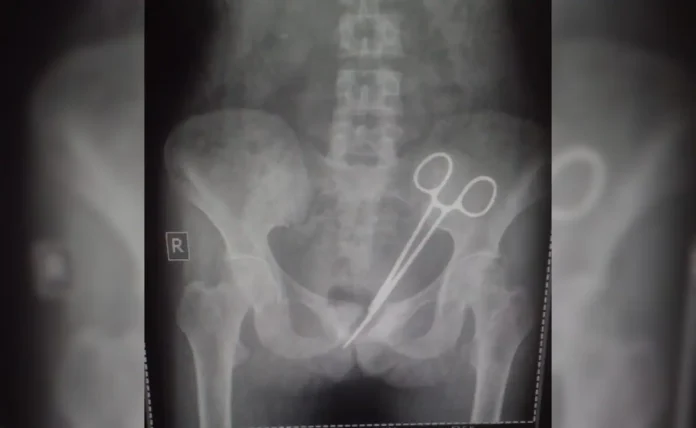In an unbelievable case of medical negligence, a woman from Sikkim discovered that a pair of surgical scissors had been left in her abdomen for an astonishing 12 years. This horrifying revelation came to light only after she underwent a recent medical examination for persistent pain, which led to an X-ray that revealed the forgotten surgical tool lodged inside her body.

The incident has sparked outrage, raising serious concerns about the quality of healthcare and the negligence of medical professionals. How could such a mistake go unnoticed for over a decade? And more importantly, how did it affect the patient’s life during all these years?
The 12-Year Ordeal: How It Happened
The victim, Tsering Wangmo, had undergone surgery at a hospital in Gangtok, Sikkim, over a decade ago. She was admitted for a routine procedure, unaware that it would lead to a nightmare spanning 12 long years. Following the surgery, Wangmo complained of frequent abdominal pain, but doctors brushed off her concerns as post-surgical symptoms, prescribing painkillers and routine medications.
For over a decade, she suffered in silence, with doctors never suspecting the true cause of her pain. It was only during a recent health checkup, after the pain became unbearable, that an X-ray revealed the shocking presence of surgical scissors inside her abdomen. The news came as a devastating blow to Wangmo and her family, who are now demanding answers and accountability.
How Could This Happen? Medical Negligence at Its Worst
The fact that surgical instruments were left inside a patient’s body for more than a decade raises serious questions about the medical standards and practices in the hospital where the surgery was performed.
- Post-Surgical Oversight: It appears that proper post-surgical procedures were not followed. Surgical instruments like scissors, scalpels, and clamps are supposed to be meticulously counted before and after any operation. The failure to account for the missing scissors points to gross negligence on the part of the surgical team and hospital.
- Missed Opportunities: Wangmo’s repeated complaints of abdominal pain should have been a red flag for her doctors. Instead of investigating further, her symptoms were routinely dismissed. Had a thorough investigation or scan been done earlier, this horrifying situation could have been avoided.
- Impact on Her Life: For 12 years, Wangmo lived with constant discomfort, which impacted her daily life, work, and overall well-being. Imagine carrying out everyday activities while unknowingly housing a sharp instrument inside your body. The mental and emotional toll this negligence has taken on her is unimaginable.
Public Outrage: Where Is the Accountability?
This case has ignited a firestorm of outrage not just in Sikkim but across India. People are demanding justice for Wangmo and stricter regulations to ensure this kind of incident never happens again.
- Medical Accountability: How can medical professionals be allowed to operate with such negligence? The hospital and the doctors involved in the surgery must face strict legal consequences. The public is asking for better oversight and stricter accountability in the healthcare system, especially when it comes to surgeries and invasive procedures.
- Government’s Role: The Sikkim government is also being questioned. How can hospitals that operate under such conditions be allowed to continue? The healthcare regulatory bodies in India need to step up and ensure that all hospitals, especially those in rural areas, follow proper procedures and protocols.
The Legal Battle: Will Wangmo Get Justice?
Wangmo’s family has already initiated legal action against the hospital and the doctors involved. They are demanding compensation not just for the medical expenses but also for the emotional distress and trauma caused by this incident.
This case is likely to turn into a landmark legal battle, with patients’ rights and medical accountability at the forefront. The outcome could set a precedent for other cases of medical negligence in India, ensuring that no other patient has to suffer the same fate.
Are Such Cases Common? Alarming Numbers of Medical Negligence in India
While this case may seem like an isolated incident, medical negligence is more common than we’d like to believe. A recent study showed that medical errors contribute to over 500,000 deaths annually in India. Misplaced instruments, wrong diagnoses, and failure to follow proper protocols are just some of the reasons why India’s healthcare system is facing a trust deficit.
- India’s Medical System in Crisis: Despite being home to some of the world’s best doctors and hospitals, India’s healthcare system is also riddled with issues like overcrowded hospitals, overworked staff, and lack of proper regulation.
- Patient Safety: The case of Tsering Wangmo is a stark reminder that patient safety should always be a top priority. Whether it’s a small clinic or a large hospital, proper checks and balances must be in place to ensure that such incidents don’t happen.
The Road Ahead: What Needs to Change in India’s Healthcare?
This case is a wake-up call for the Indian healthcare system. Medical negligence can no longer be brushed under the carpet.
- Stricter Regulations: There needs to be a thorough overhaul of India’s healthcare regulations. From surgical protocols to post-surgical care, hospitals should be held to the highest standards, and any deviation should result in immediate action.
- Transparency and Accountability: Hospitals must maintain complete transparency in their procedures. In cases of errors, they should be quick to admit their fault and compensate patients, instead of hiding behind bureaucracy.
- Empowering Patients: Patients, especially in rural areas, need to be made aware of their rights. The government and NGOs should run campaigns to educate people about what they should expect from their healthcare providers and what they should do in cases of medical negligence.
Conclusion: A Long Road to Justice for Tsering Wangmo
As Tsering Wangmo prepares for another surgery to remove the scissors, her story serves as a grim reminder of the failures in India’s healthcare system. While she may have lived with the negligence for 12 years, her fight for justice is just beginning.
This case should be a wake-up call for both the medical community and regulatory bodies in India. Patients’ lives are at stake, and negligence like this should never be allowed to happen again.

